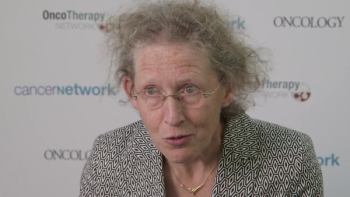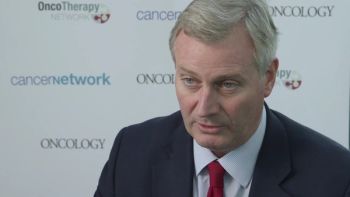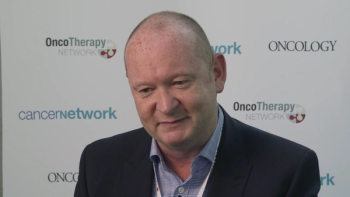
Lenalidomide maintenance significantly improves survival in patients with relapsed diffuse large B-cell lymphoma (DLBCL) who are not eligible for autologous stem cell transplantation (ASCT).

Your AI-Trained Oncology Knowledge Connection!


Lenalidomide maintenance significantly improves survival in patients with relapsed diffuse large B-cell lymphoma (DLBCL) who are not eligible for autologous stem cell transplantation (ASCT).

I currently have a 77-year-old non-Hodgkin lymphoma patient that recently started bendamustine/rituximab combination therapy. After increasing the intravenous rituximab rate per protocol, she developed chills.

For the first time, a study shows that using an immunomodulatory agent as maintenance therapy prolongs progression-free survival for patients with diffuse large B-cell lymphoma after first-line treatment with rituximab plus CHOP.

A study of pediatric acute lymphoblastic leukemia (ALL) has identified IKZF1 as a new ALL predisposition gene that may play a role both in leukemia pathogenesis and treatment responsiveness.

Ibrutinib can be safely combined with lenalidomide and rituximab in patients with relapsed or refractory diffuse large B-cell lymphoma, according to a new study presented at the American Society of Hematology 58th Annual Meeting and Exposition, held December 3–6.

This interview examines treatment-related cardiotoxicity and the risk of second malignancy in patients with Hodgkin lymphoma.

This interview examines the role of functional imaging to direct therapy (escalation or de-escalation) for early and advanced Hodgkin lymphoma.

In this video we discuss longer term results of the phase III SABRINA study, which tested the safety and efficacy of subcutaneous rituximab in patients with follicular lymphoma.

We are speaking with Sonali Smith, MD, an associate professor of medicine and the director of the lymphoma program at the University of Chicago. At the ASH meeting, Dr. Smith will give a talk called “Emerging Biology Leading to New Therapies in Follicular Lymphoma.”

Brentuximab vedotin (BV) induces significantly superior clinical outcomes in patients with CD30-expressing cutaneous T-cell lymphoma (CTCL) as compared with physician's choice with methotrexate or bexarotene, according to a new study presented at the American Society of Hematology Annual Meeting & Exposition, held December 3–6, 2016.

Pembrolizumab has good activity, is safe and well-tolerated, and induces durable responses in cutaneous T-cell lymphomas, according to a study presented at the American Society of Hematology Annual Meeting & Exposition.

As part of our coverage of the ASH Annual Meeting, we are discussing novel agents and strategies for relapsed/refractory Hodgkin lymphoma.

As part of our coverage of the ASH Annual Meeting held December 3rd to 6th in San Diego, today we are speaking with Kim Nichols, MD, director of the Cancer Predisposition Division at St. Jude Children's Research Hospital. At this year’s meeting, Dr. Nichols will be participating in a session on genetic susceptibility to leukemia.

Patients with AML or MDS with unfavorable risk cytogenetic profiles, TP53 mutations, or both had good clinical response and robust mutation clearance with decitabine.

A high-risk subtype of acute lymphoblastic leukemia first identified in children appears to be highly prevalent in adults with ALL and is associated with a poor outcome.

The use of radiotherapy may have an important role in optimizing first-line treatment for patients with early-stage extranodal natural killer/T-cell lymphoma.

According to a long-term follow-up analysis of a phase I/II trial, bosutinib provides durable responses and a favorable toxicity profile in patients with chronic phase CML who are resistant/intolerant to other tyrosine kinase inhibitors.

Single-agent blinatumomab demonstrated antileukemia activity in pediatric patients with relapsed or refractory B-cell precursor acute lymphoblastic leukemia (BCP-ALL) in a recently published phase I/II study.

Although ibrutinib-related atrial fibrillation (IRAF) occurs in up to 11% of patients in clinical trials, these studies have rarely fully characterized bleeding events or risk factors for bleeding when ibrutinib is combined with anticoagulation. Furthermore, guidelines do not provide direction regarding the preferred anti-arrhythmic agent for IRAF.

Expression levels of CD62L and related immunologic markers are correlated with treatment responses and outcome in patients with CML, according to a new analysis. The markers could have prognostic value if validated in other cohorts.

The combination of ATRA and arsenic trioxide for the treatment of low- or intermediate-risk acute promyelocytic leukemia had advantages compared with ATRA plus chemotherapy.

A study found that deregulation of homeobox transcription factor genes underlies a subtype of precursor B-cell acute lymphoblastic leukemia.

Patients with chronic myeloid leukemia with a history of prior malignancies generally fare as well as those without such a history, according to a new study.

Chronic infection with hepatitis B or C virus was associated with an increased risk for non-Hodgkin lymphoma among patients with HIV who are on antiretroviral therapy.

A new collaboration among industry, nonprofit, academia, and the federal government may lead to a change in the treatment paradigm for acute myeloid leukemia.